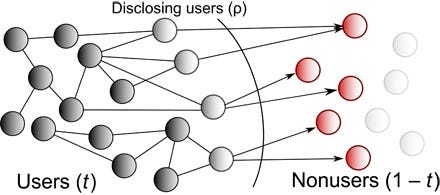Facebook knows me better than my wife does
Facebook knows me better than my wife does
Big data and predictive analytics are eroding individual privacy
“Some recent articles have suggested that we must be listening to people’s conversations in order to show them relevant ads,” said Facebook in a 2016 statement titled Facebook Does Not Use Your Phone’s Microphone for Ads or News Feed Stories
The statement was in response to articles and social media accusations based on eerie coincidences.
“[Me] and my girlfriend had a first time conversation about the possibility of us using IVF in the future…. next morning I woke up to these [IVF] adverts on my news feed,” said Katie on Twitter. “I do not follow nor have liked any pages relating to this topic at all.”

The truth is even scarier: Facebook doesn’t need to listen because it already knows enough about you to predict your behaviour.
Data can be used to predict human behaviour
A decade earlier, a statistician at Target combined his interests in data science and human behaviour to develop a ‘pregnancy-prediction’ model. By analysing Target’s enormous data set of shoppers’ buying behaviour, Andrew Pole identified the product purchases and changes common to expectant mothers. When a shopper triggered the algorithm, the marketing team could target them with baby-related coupons and catalogues.
A chilling detail emerged in a 2012 NY Times article: a father complained that his teenaged daughter had been sent coupons for baby clothes. He thought the supermarket was encouraging high-schoolers to become pregnant. He later apologised; his daughter had confessed the truth. The model was so good it knew before he did.


Metadata reveals more than you think
Metadata is ‘data about data’, e.g. the details of when you sent a text message, to which number, how long it was, and your phone’s location; but not the actual content of the message. In Australia your phone and internet providers must, by law, store your metadata for two years and provide it to intelligence and law enforcement agencies on request.
Metadata seems harmless but it can reveal sensitive personal information. Stanford researchers uncovered the personal identities of 82% of research subjects, and matched them to specific medical diagnoses (cardiac arrhythmia, multiple sclerosis, early stage pregnancy), the purchase of a gun (and the likely model), and intention to grow marijuana, all extrapolated from phone metadata.
Who else collects your data? Both Apple and Google have been caught. And they are far from alone.


Recent research found “robust evidence” that shadow profiles can predict personal details, such as relationship status and sexual orientation, of non-users.
Technology invades new spaces
We have never had so little control over who knows intimate details of our lives. Technology makes data collection and analysis faster, easier, and more pervasive.
In Canada two shopping centres were caught using facial recognition to analyse shopper demographics. Similar technology is being tested to automate the tracking of students’ attendance in class.
An AI expert told me that the hardest part of implementing such technologies is complying with privacy legislation. How many companies would skip that part?

Solutions: Awareness, Action and Leadership
The first part of a solution is awareness; acknowledgement that nothing is free and corporations are driven by revenue. We need to educate our peers and children that they are not the customer; they’re the product.
(Note: Quote Investigator traced this sentiment back to 1973, and the direct quote to 2001, both relating to television. It was first used in 2010 in relation to internet services.)
One response to this is the emergence of businesses that manage data and give customers a share of the revenue from selling the insights.
Part two is for individuals to exercise greater scrutiny. If you don’t like Facebook’s actions on privacy, disconnect. Don’t give them the two things that drive revenue: your data and attention. Declare yourself a ‘tech vegan’: someone whose technology choices are driven by principles.
Part three is strong leadership from governments. The EU’s GDPR legislation demonstrates the impact the threat of fines can have on data protection in global corporations. The response to GDPR’s implementation gives me hope. Maybe further legislation will give me control over who, other than my wife, can predict what I want for Christmas.
